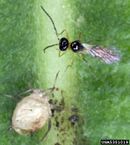Journal of Pest Science (2016) 89, 7-20
From Pestinfo-Wiki
 | Selected publication you are invited to contribute to the discussion section (above tab) |
Aphid parasitoid generalism: development, assessment, and implications for biocontrol
Journal of Pest Science 89 (1), 7-20
Abstract: Host specialization in aphid parasitoids is important both from a theoretical and an applied point of view. It arises from various ecological mechanisms involving their interactions with aphids, host plants, and endosymbiotic bacteria, as well as with potential competitors and enemies. From an applied point of view, host specialization in aphid parasitoids has a great importance as it determines the biological control they provide through their capacity to switch between different hosts, to persist in the agrosystem in the absence of the pest, and to regulate pest outbreaks in a rapidly changing system. It also conditions the risk of undesirable effects on non-target species in the case of introduction or augmentation of populations of parasitoids. Biocontrol literature that looks at the benefits of generalist and specialists natural enemies is mainly focused on differences between different guilds of natural enemies and does not consider the differences in host specialization within a single guild. This review synthesizes the mechanisms related to host-use by aphid parasitoids, focusing on the differences between generalist and specialist species. Second, this work describes the difficulty to determine the host range of generalist parasitoid species. Our review points out some observational artifacts, as is the existence of cryptic species or spatiotemporal variability in host acceptance, which may lead to misinterpretations about host specialization and result in pest management failures. Regarding biological control services, moderately generalized species that could use various host species to sustain their populations may ensure the long-term control, whereas specialist species would provide higher parasitism rates. At the community level, the co-occurrence of specialist and generalist parasitoids may maximize biological control services both in terms of efficiency and in terms of stability in space and time.
(The abstract is excluded from the Creative Commons licence and has been copied with permission by the publisher.)
Link to article at publishers website
Database assignments for author(s): Lucie Raymond, Blas Lavandero, Vesna Gagic
Research topic(s) for pests/diseases/weeds:
biocontrol - natural enemies
Research topic(s) for beneficials or antagonists:
general biology - morphology - evolution
Pest and/or beneficial records:
| Beneficial | Pest/Disease/Weed | Crop/Product | Country | Quarant. |
|---|---|---|---|---|
| Aphidius ervi (parasitoid) |